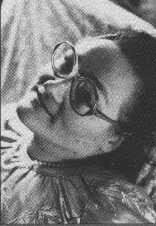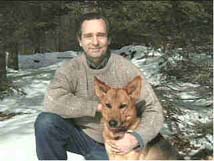 |
Carol Purington was born in 1949 in the Massachusetts farmhouse where she still lives,
on land that her family has farmed since the end of the Revolutionary War. Life on the
farm is the inspiration for much of her poetry. In 1955 she contracted paralytic polio,
which left her permanently disabled; respiratory devices and a computer she talks into
are part of her daily life. "It was the gift of a book, in 1979, that led me to haiku. At first
I read and studied and wrote alone, not even finding the haiku magazines for several
years. Slowly I made a path from my world, a New England dairy farm, into the haiku
community."
|
|
|
|
|
|
Carol Purington was born in 1949 in the Massachusetts farmhouse where she still lives,
on land that her family has farmed since the end of the Revolutionary War. Life on the
farm is the inspiration for much of her poetry. In 1955 she contracted paralytic polio,
which left her permanently disabled; respiratory devices and a computer she talks into
are part of her daily life. "It was the gift of a book, in 1979, that led me to haiku. At first
I read and studied and wrote alone, not even finding the haiku magazines for several
years. Slowly I made a path from my world, a New England dairy farm, into the haiku
community."
|
|
Carol Purington was born in 1949 in the Massachusetts farmhouse where she still lives,
on land that her family has farmed since the end of the Revolutionary War. Life on the
farm is the inspiration for much of her poetry. In 1955 she contracted paralytic polio,
which left her permanently disabled; respiratory devices and a computer she talks into
are part of her daily life. "It was the gift of a book, in 1979, that led me to haiku. At first
I read and studied and wrote alone, not even finding the haiku magazines for several
years. Slowly I made a path from my world, a New England dairy farm, into the haiku
community."
|
|
|
|
|
Carol
Purington was born in 1949 in the Massachusetts farmhouse
where she still lives, on land that her family has farmed
since the end of the Revolutionary War. Life on the farm is
the inspiration for much of her poetry. In 1955 she contracted
paralytic polio, which left her permanently disabled; respiratory
devices and a computer she talks into are part of her daily
life. "It was the gift of a book, in 1979, that led me
to haiku. At first I read and studied and wrote alone, not
even finding the haiku magazines for several years. Slowly
I made a path from my world, a New England dairy farm, into
the haiku community."
|
|
|
|
Over the last two decades she has written about natural and historical images of the Western Massachusetts
hills that are her home, working within the structure provided by haiku and tanka. Carol has received
numerous awards over the years for her haiku, is well represented in "Wind Five Folded," an anthology of
English-language tanka, and is included in William Higginson's "Haiku World: an International Poetry
Almanac," as well as Bruce Ross's "How to Haiku." She publishes regularly in the haiku and tanka magazines
and the Christian Science Monitor.
Books by Carol Purington:
Woodslawn Farm: Haiku For A New England Year
Braided Rug: Haiku And Variations (with sally l. nichols)
Family Farm: Haiku For A Place of Moons
The Trees Bleed Sweetness: A Tanka Narrative
A Pattern For This Place: Words Of A Pioneer Woman
_________________________________________________________________________________________
|
|
|
|
|
 |
Larry Kimmel was born in 1940, in Johnstown, Pennsylvania. He holds degrees from
Oberlin Conservatory and Pittsburgh University, and has worked at everything from
steel mills to libraries. He has five collections of poetry, one published novel, and a
chapbook of brief essays, listed below:
|
|
|
|
|
|
|


